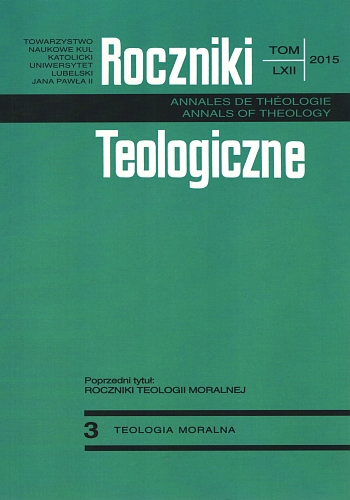Antropologiczne implikacje sztucznej prokreacji
Anthropological Implications of Artificial Procreation
Author(s): Józef WróbelSubject(s): Christian Theology and Religion, Systematic Theology
Published by: Towarzystwo Naukowe KUL & Katolicki Uniwersytet Lubelski Jana Pawła II
Keywords: procreation;artificial procreation;in vitro fertilization;anthropology;personalistic principle;
Summary/Abstract: The issue of artificial procreation may be analyzed from a variety of points of view. Analyses made from the legal and social points of view, from the point of view of the situation of the child in same-sex relations and from the point of view of the consequences for the health of the child and the mother are the dominant ones. The anthropological dimension is very important, since it takes into consideration artificial insemination and situations that are possible in the future if improved techniques make it possible to depart from the circumstances that may be objectable and from the consequences of their use. The anthropological dimension dominates in all the documents issued by the Magisterium in which the issue of artificial procreation is discussed. In this dimension two aspects may be distinguished. The first one assesses the technical interferences with procreation from the perspectives of human sexuality co-constituting the human person and of fertility as the fruit and the sign of marital love. The act of procreation that is adequate to the spouses’ dignity may not be limited to one dimension only: either exclusively the spiritual, or exclusively the carnal one; and hence it may not be separated from the personal, spiritual-carnal unification of the parents. However, in artificial procreation this „determination of unity and determination of parenthood” is broken off.The other aspect is concerned with the personalistic principle that forbids treating a person as an object or as a means to reach an aim; it orders treating it as a value in itself and an aim in itself. This principle also directs human procreation. At no moment of the existence of the child may the parents treat it as an „object”−„means” satisfying their desire or allowing them to achieve their aims. In the same way the specialists following the procedure of artificial insemination do not have the right to make decisions about the child’s life, for in this way they make themselves „lords” of the child; they usurp the right to make the decisions about the child, its birth, its life or death. This is especially well seen in the case of cryoconservation of human embryos. Such a relation is not permitted by the child's personal dignity.
Journal: Roczniki Teologiczne
- Issue Year: 62/2015
- Issue No: 03
- Page Range: 77-100
- Page Count: 24
- Language: Polish

